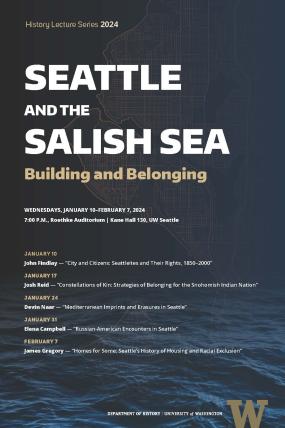Seattle and the greater Puget Sound region are home to millions, but what first drew people to this area? How did they adapt to this new place? What about the Native population who was already here? In this year's History Lecture Series, UW History faculty will examine the historical demographics of the region's population through the lens of groups that have come to inhabit the area over the decades.
The Department of History invites you to join us for the 49th History Lecture Series, Seattle and the Salish Sea: Building and Belonging taking place Wednesdays, January 10 through February 7 at 7:00 p.m. in Roethke Auditorium, Kane Hall.
Tickets are available beginning December 10 through events.uw.edu/HLS2024.
City and Citizens: Seattleites and Their Rights, 1850-2000
January 10
In this talk, Professor Emeritus John Findlay focuses on the changing populations of Seattle and how they were shaped by the nation’s evolving concepts of citizenship. It examines the historical demographics of the city and look at what groups of people came to and settled in Seattle over the decades. It also explores how laws and policies regarding citizenship influenced who came and stayed and who was and was not welcome in the city. Largely national in scope, those laws and policies governed immigration and naturalization, voting rights and civil rights, and the status of Native peoples, among other things. Seattleites did not merely accept, apply, and endure federal laws and policies, however. At times they defied national guidelines by trying to substitute their own or by campaigning to redefine who could or could not possess the rights of citizenship.
Constellations of Kin: Strategies of Belonging for the Snohomish Indian Nation
January 17
With varying degrees of success, Snohomish peoples met the challenges of settler expansion by trying to “work the colonial system,” including navigating the ever-changing bureaucracy of federal policies and the settler economy, in order to stay in their homelands. This talk by Professor Josh Reid focuses largely on the period from the mid-nineteenth century to the early twentieth century and discusses topics related to the Treaty of Point Elliott, the formation of initial reservations in western Washington, Indian boarding schools, and the complexities of Coast Salish identities.
Mediterranean Imprints and Erasures in Seattle
January 24
From the Central District to Pike Place Market and beyond, migrants from the Mediterranean region have made a notable, if seldom noticed, impact on Seattle's urban fabric over the past century, perhaps no group more than Sephardic Jews from the Ottoman Empire. Professor Devin Naar takes a look at how Seattle became home to one of the largest communities in the United States of Jews from the Muslim world. What brought them from the Mediterranean--especially towns near Istanbul in Turkey and the island of Rhodes in Greece--to the Pacific Northwest in the twentieth century? What obstacles did they encounter along the way? What opportunities did they find here? How did they interact with both Indigenous and settler societies? How has their sense of community and culture transformed over the generations?
Russian-American Encounters in Seattle
January 31
Russia and the U.S. are Pacific neighbors by virtue of geography. Did this geographic proximity matter in Seattle’s relations with Russia? This talk by Professor Elena Campbell explores the multifaceted history of Seattle’s engagement with peoples from the Romanov Empire and the Soviet Union which included trade relations and commerce, Russian emigration, the “Red Scare,” Russian studies, and citizen diplomacy.
Homes for Some: Seattle's History of Housing and Racial Exclusion
February 7
Seattle has a long history of policies and practices that prevented people of certain racial and religious backgrounds from buying, renting, or occupying homes in many parts of the city and surrounding areas. Starting with the 1865 ordinance that banned Indigenous people, Professor James Gregory details this history of exclusion by showing how it was implemented through laws, zoning, deed restrictions, redlining, urban renewal, and other governmental actions and through the organized efforts of real estate professionals, banks, and neighborhood associations. The excluded often fought back, and some forms of resistance including campaigns by Black, Japanese American, Chinese American, and Filipino American community groups will be examined. Finally, this talk will also assess the way this history shapes the present, highlighting continuing patterns of housing exclusion and ongoing efforts to open opportunities, including discussion of the 2023 state law (Covenant Homeownership Account Act - HB 1474) that provides compensation to victims of racial restrictive covenants and other forms of state sanctioned housing discrimination.
